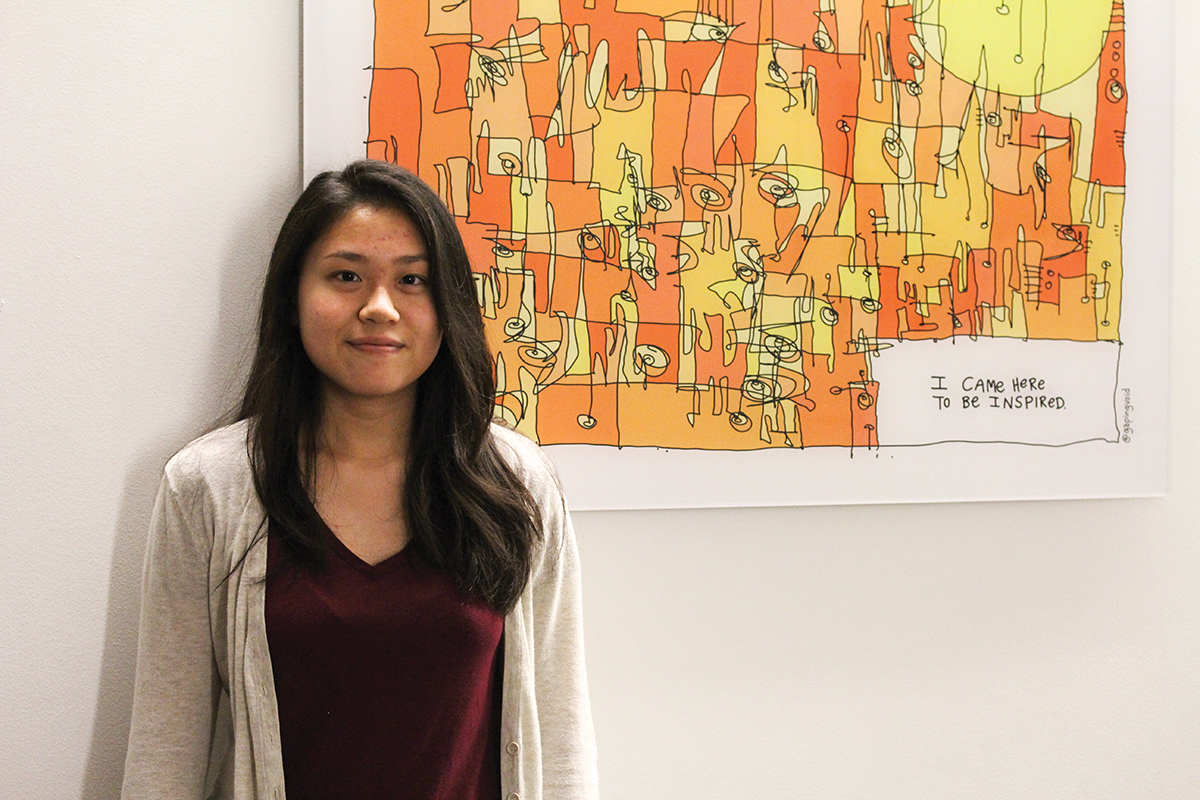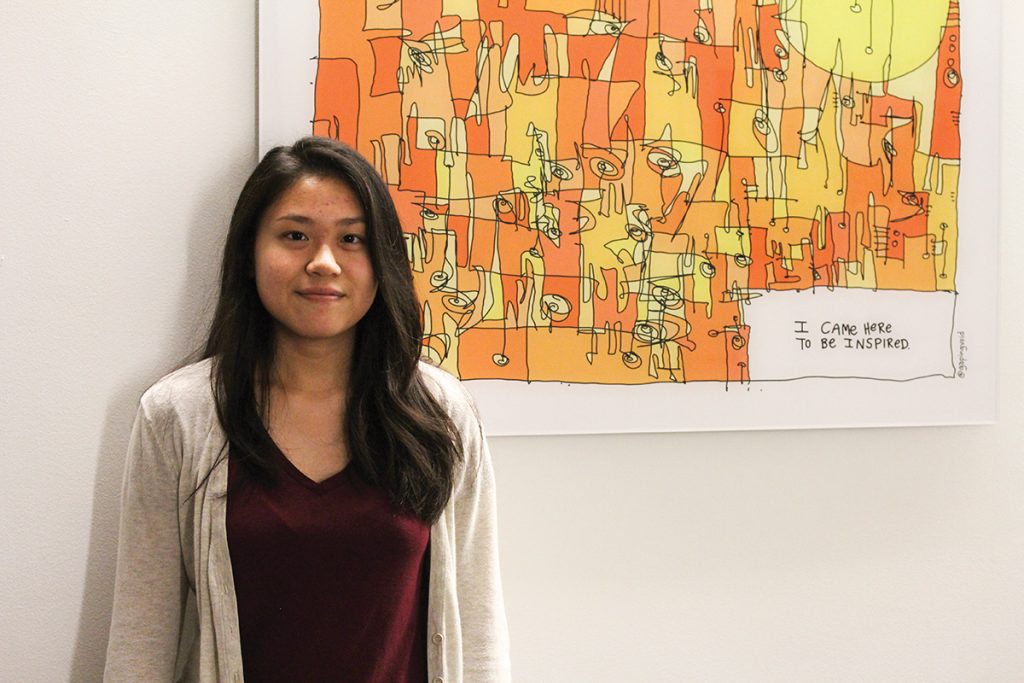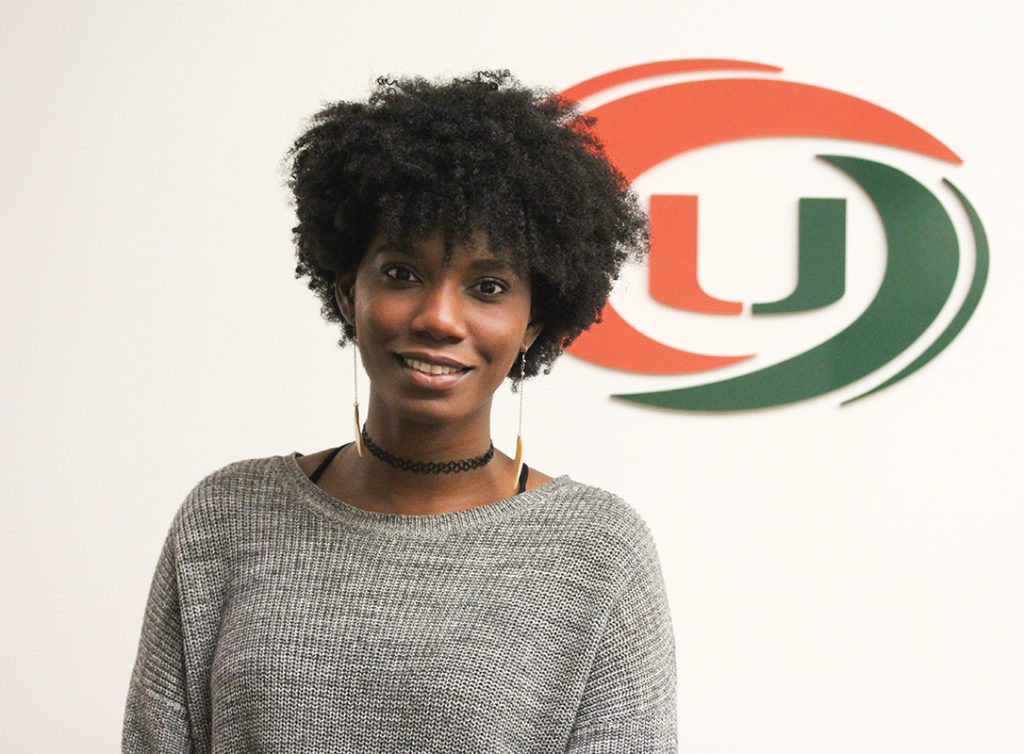

Each year, more than 2 million high schoolers endure the dreaded college application process, often guided by counselors and parents, people who most likely went through the same experience. But for some students, answers to basic questions about higher education are hard to come by. First-generation student Jennifer Chavez had to turn to the internet to plan her future.
“I actually Yahoo Answered ‘How to apply for college.’ It’s a pretty sad part of my story but, it’s true, it happened,” said Chavez, who is now a senior at UM.
First-generation students like Chavez, individuals who are the first in their family to seek a degree at a four-year institution, make up approximately 50 percent of the total college population, according to the U.S. Department of Education.
For Chavez, the college application process was the first step in obtaining not only a higher education but also a better life for her family.
Born to parents fleeing a civil war in El Salvador and poverty in Nicaragua, Chavez said her mother would constantly remind her to “make something” of herself. Chavez said she was inspired to become a doctor by her high school biology teacher but didn’t know which path to take to reach her goal.
Chavez said she relied heavily on South Dade Senior High School’s College Assistance Program (CAP), a local nonprofit associated with the school district. An adviser was assigned to help students find colleges and financial aid opportunities.
“There are things that first-generation college students don’t really listen to. You don’t pay attention to your CAP adviser, you don’t pay attention to deadlines and things like that,” she said.
Though Chavez actively sought out help, she was still uncertain about how the process worked. She applied to Ivy League universities she had previously heard of including Johns Hopkins, Yale, Harvard and Columbia University. Chavez was wait-listed at Yale and Columbia.
“Had I known now what I know about applying, I would have applied everywhere. It just wasn’t in my plan,” Chavez said.
Chavez was in need of financial assistance to attend college. The only problem was, she didn’t know how to apply for scholarships or the Free Application for Federal Student Aid (FAFSA).
Chavez said that at the time, she was also unaware of many merit-based scholarship options offered at UM, including the Ronald A. Hammond Scholarship, a full-tuition UM scholarship, and the Gates Millennium Scholarship, offered by UM as part of the national Gates Millennium Scholars Program.
Both scholarships are administered by the UM Office of Academic Enhancement (OAE) and are targeted toward high-achieving applicants of underrepresented backgrounds, which includes many first-generation students.
Not knowing about these opportunities, Chavez said she took out private loans to attend UM.
“I owe upward of $90,000 in debt because I didn’t know what my options were,” she said. “So, I’m in debt. I can’t afford to be here but I am blessed to be here.”
UM has taken steps in the past year to assist underrepresented students, including first-generation students, in navigating their college experience. UM created a new position last year in the Office of Academic Enhancement: senior academic adviser for diversity and inclusion. Whitley Johnson was hired in Fall 2016 to fill the position.
According to Johnson, there are more than 1,200 first generation college students at UM.
“My role is working with underrepresented and first generation students to provide advising and targeted outreach programs,” Johnson said. “Really making sure that they have a holistic college experience and prepare them for graduation.”
Chavez said her debt is something she worries about in the future.
“…I’m going to have to figure out how to pay for it, and if I don’t become a doctor, it’s going to be really hard,” she said.
According to the National Center for Education Statistics, 85 percent of first-time, full-time undergraduates received financial aid in 2013-14 and at private institutions such as UM, students receive 5 percent more financial assistance than those attending public institutions.
Chavez said it’s because of mistakes she has made that she and a friend, Crystal Lam, took the initiative to create First Generation U, a student organization made up of about 20 members. Officially installed in spring 2016, the organization provides first-generation students at UM with resources to ease the transition into higher learning.
“The first-generation narrative is not knowing what to do when you get to college. First off, not knowing that you can get to college. Not knowing what your options are and not knowing, when you’re here, how you fit in,” Chavez said.

BEING FIRST
For Lam, the co-founder of First Generation U, the idea to create the organization came after a long and lonely first semester of college that lead her to attempt to transfer out of UM.
Lam said throughout the semester she began to notice a difference between herself and her peers. College jargon that seemed obvious to everyone else wasn’t to her. She didn’t understand why she was struggling so much.
“I was wondering why everyone just seemed smarter. Everyone knew what office hours was, everyone knew what the FAFSA was,” Lam said. “And then looking forward to the future, people were talking about med school, grad school, dental school, I didn’t know how to get there or what that was. So I just thought, ‘Maybe I’m just stupid.’”
Uncertainty plagued Lam throughout her first semester as she struggled to assimilate to the college curriculum. After doing poorly on one of her first exams, she said she was unsure on how to proceed in getting help from her professor because she was unaware what office hours were.
Lam said she became so unhappy during her freshman year that she applied to transfer to Georgetown University (GU), the school her brother was attending. She knew GU had resources for first-generation students, including financial support and mentorship. Her transfer application was declined, so Lam had to continue studying at UM.
Lam said though she was unhappy, the importance of education was a powerful driving force behind her commitment to stay. The chance at a higher education was not one given to everyone, something she was keenly aware of as a child of refugee parents from Vietnam.
Her father completed high school in Vietnam but did not pursue a post-secondary education. Her mother wasn’t allowed to finish middle school, because in Vietnam the idea was that women didn’t need an education, according to Lam. Lam’s grandmother’s only exposure to an education was when she learned her name in kindergarten.
“Really excited to graduate, and, honestly, a little bit guilty that me, of all people … I have this opportunity,” she said.
Though Lam, a psychology major, said her experience throughout college has been anything but easy, she takes pride in becoming the first female in her family to graduate college as of May 2017. Lam has applied to four graduate schools to pursue a master’s in public health.
“Being first-generation is going to continue,” she said. “Whether you’re continuing your education or not, you’re always going to be that pioneer for everyone in your family behind you.”
TRANSITIONING

While Lam was born and raised in the United States, many first-generation students are born abroad themselves. They come to America for a better education but must undergo a difficult cultural transition. One of these students is Chinonyelum “ChiChi” Maduka, a senior from Nigeria.
Maduka lived in Nigeria until she was 10 years old, when she came to the United States on vacation with her mother during summer break. Her mother enrolled her in a public elementary school for a week to give her a taste of the American educational system. After her first day of school, Maduka said she refused to go back to Nigeria.
“I said ‘Mom, I’m not going back. Mom, they gave me a computer, they gave textbooks for free, everywhere is air-conditioned, they gave me food at school, my teacher is nice, the classroom setting is small,’” she said. “Even at such a young age … I knew that this was just a more conducive environment for me to get an education.”
Following a phone conversation with her father, who stayed in Nigeria, Maduka said her parents made the sacrifice to fulfill her wish to stay in order to get a better education. For five years, Maduka’s parents maintained a marriage continents apart, her mother worked three jobs, and Maduka made her way through the U.S. education system.
Now thousands of miles away from Nigeria, she had to find a balance between her roots and her new home.
“African Americans and being African is different. It was weird seeing someone my skin color but they didn’t sound like me, they didn’t understand my culture,” she said.
Despite feeling comfortable in American culture, when it came time to apply for college, Maduka shared the same uncertainty faced by many other first-generation applicants regarding the process and financial aid. Maduka decided to take control of her college experience and ask questions to anyone who could have answers.
“I just knew I had to absorb all the resources I could to make sure I had as equal chance as everyone else,” she said.
Maduka has had to fight for her education – she is a full-time student and works four jobs to pay for school expenses, leaving her with little time for extracurricular activities – but she said the sacrifices are worth it.
“It might be hard but we’re going to persevere through it because it means a lot to us. It means a lot to our family. We are breaking the cycle,” she said.
MOTIVATION
Family and motivation. For many first-generation students like senior Victoria De Cardenas, these reasons keep them going.
For De Cardenas, a broadcast journalism major, all signs throughout her life seemed to point toward UM. Her father, a first-generation Cuban-American who dropped out of high school but obtained a GED, taught her from a young age how to throw up the ‘U’ in photos. Her mother, a Cuban immigrant who finished high school and became a banker after graduation, was the banker for a UM alumnus who constantly told her that Victoria should go to UM.
UM was always the dream, but as a first-generation college student, De Cardenas didn’t think it was financially feasible. During her senior year of high school, she applied and was accepted with a full scholarship to Miami-Dade College’s (MDC) Honors College, a two year program.
At MDC, she learned more about scholarships, financial aid and fee waivers, and with new tools, she applied to transfer to UM, which had always seemed a dream out of reach. She was accepted.
“I still have the email that says ‘see you in August’ in my email and I see it every day,” she said. “I think about it every day how amazing and blessed I am to be here.”
Though De Cardenas filled out her applications and financial aid documentation alone, she said on the road to get to and through college she was well-accompanied by her family.
“I hope I make them proud and that’s what really motivates me is really wanting to set a good example for my sister…,” she said. “It’s OK to have fun, but know that education shouldn’t be taken for granted. Not everyone gets this opportunity.”






